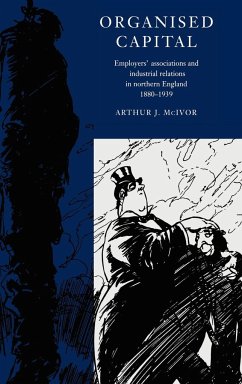This detailed study contributes to an expanding field of interest: the social history of industrial employers. Using previously untapped primary sources, Organised Capital explores the emergence of employers' organisations in northern England and analyses their policies during the heyday of collective activity. Arthur McIvor evaluates the impact of trade unionism, state intervention, war, economic recession and changing product markets on these organisations, charting their role and patterns of growth. He challenges notions of a monolithic employer group and crude economic determinism, while also rejecting 'revisionist' accounts of weak and ineffective employers. Instead, he reaches a more balanced appraisal of these institutions' role in capital-labour relations and the pursuit of employers' class interests. This book will be of interest both to historians and to students of industrial relations.
Table of contents:
Introduction; Part I. Setting the Scene: 1. Context and historiography; 2. The legacy: origins of employers' associations; Part II. Forging Employers' Associations, 1880-1920: 3. Organisation, membership and solidarity; 4. Strikebreaking; 5. Collective bargaining and procedural control; 6. The impact of World War One; Part III. Reacting to the Economic Slump: 7. The millowners' counter-attack; 8. Stabilising labour markets: building; 9. Defending managerial prerogative: engineering; Conclusion.
Using previously untapped sources, Arthur McIvor examines employers' organisations from a regional perspective, analysing their growth and activities.
A detailed study of employer organisations, charting their growth, activities and policies.
Hinweis: Dieser Artikel kann nur an eine deutsche Lieferadresse ausgeliefert werden.
Table of contents:
Introduction; Part I. Setting the Scene: 1. Context and historiography; 2. The legacy: origins of employers' associations; Part II. Forging Employers' Associations, 1880-1920: 3. Organisation, membership and solidarity; 4. Strikebreaking; 5. Collective bargaining and procedural control; 6. The impact of World War One; Part III. Reacting to the Economic Slump: 7. The millowners' counter-attack; 8. Stabilising labour markets: building; 9. Defending managerial prerogative: engineering; Conclusion.
Using previously untapped sources, Arthur McIvor examines employers' organisations from a regional perspective, analysing their growth and activities.
A detailed study of employer organisations, charting their growth, activities and policies.
Hinweis: Dieser Artikel kann nur an eine deutsche Lieferadresse ausgeliefert werden.








